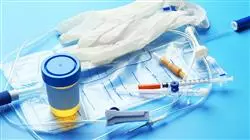University certificate
The world's largest faculty of medicine”
Introduction to the Program
A high-level specialization that will enable you to train you to care for pediatric patients with infectious diseases with advanced symptoms”

During their daily work in the Emergency Room, physicians are confronted with a multitude of cases that can become complicated because their diagnosis is already at an advanced stage. Infections are one of those diseases that may not be diagnosed early, since not all of them present visible symptoms. In addition to the infectious diseases already known, there are others that have recently appeared or that are common in other countries and that, therefore, are not found in the day-to-day work of the physician, but that, when the time comes, they have to face them and know how to deal with them.
In this case, this program offers a complete training oriented to specialize physicians in infectious diseases that affect children and that, due to their complexity or because they have symptoms that can be harmful to children, end up being treated in the Emergency Room. Specifically, the training program includes classic aspects in the management of infectious pathology by apparatus or organs, incorporating new items essential for the correct management of infectious diseases in the current scenario of globalization of health. But, as it could not be otherwise, the main content is aimed at knowing the main infectious diseases affecting children in order to know the best way to take care of them. The fact is that the complexity that can be involved in the urgent care of pediatric patients with infectious diseases requires high-level training to qualify healthcare professionals.
On the other hand, being a 100% online training, the professional will have the ability to decide when and from where to study, without commitments or obligations, thus being able to combine their study time with the rest of their daily obligations.
We offer you a complete training on infectious diseases in children so that you can improve your skills in the care of your patients"
This Postgraduate diploma in Infectious Diseases in Pediatric Patient Emergencies contains the most complete and up-to-date scientific program on the market. The most important features of the program include:
- The development of clinical cases presented by experts in infectious diseases in pediatric patients
- The graphic, schematic, and eminently practical contents with which they are created provide scientific and practical information on the disciplines that are essential for professional practice
- Therapeutic developments on intervention in infectious diseases
- Practical exercises where the self-assessment process can be carried out to improve learning
- An algorithm-based interactive learning system for decision-making in the clinical situations presented throughout the course
- Special emphasis on research methodologies
- Theoretical lessons, questions to the expert, debate forums on controversial topics, and individual reflection assignments
- Content that is accessible from any fixed or portable device with an Internet connection
This Postgraduate diploma may be the best investment you can make in the selection of an up-to-date program for two reasons: in addition to updating your knowledge in Infectious Diseases in Pediatric Patient Emergencies, you will obtain a Postgraduate diploma from TECH Global University"
It includes in its teaching staff professionals belonging to the field of Infectious Diseases in Pediatric Patient Emergencies, who pour into this specialization the experience of their work, in addition to recognized specialists belonging to scientific societies of reference.
The multimedia content developed with the latest educational technology will provide the professional with situated and contextual learning, i.e., a simulated environment that will provide immersive training program to train in real situations.
This program is designed around Problem Based Learning, whereby the physician must try to solve the different professional practice situations that arise during the course. For this purpose, the physician will be assisted by an innovative interactive video system created by renowned experts the field of Pediatric Patient Emergencies and has extensive teaching experience.
Increase your decision-making confidence by updating your knowledge through this Postgraduate diploma"

Take the opportunity to learn about the latest advances in Infectious Diseases in Pediatric Patient Emergencies and improve your patient care"
Why study at TECH?
TECH is the world’s largest online university. With an impressive catalog of more than 14,000 university programs available in 11 languages, it is positioned as a leader in employability, with a 99% job placement rate. In addition, it relies on an enormous faculty of more than 6,000 professors of the highest international renown.

Study at the world's largest online university and guarantee your professional success. The future starts at TECH”
The world’s best online university according to FORBES
The prestigious Forbes magazine, specialized in business and finance, has highlighted TECH as “the world's best online university” This is what they have recently stated in an article in their digital edition in which they echo the success story of this institution, “thanks to the academic offer it provides, the selection of its teaching staff, and an innovative learning method aimed at educating the professionals of the future”
A revolutionary study method, a cutting-edge faculty and a practical focus: the key to TECH's success.
The most complete study plans on the university scene
TECH offers the most complete study plans on the university scene, with syllabuses that cover fundamental concepts and, at the same time, the main scientific advances in their specific scientific areas. In addition, these programs are continuously being updated to guarantee students the academic vanguard and the most in-demand professional skills. In this way, the university's qualifications provide its graduates with a significant advantage to propel their careers to success.
TECH offers the most comprehensive and intensive study plans on the current university scene.
A world-class teaching staff
TECH's teaching staff is made up of more than 6,000 professors with the highest international recognition. Professors, researchers and top executives of multinational companies, including Isaiah Covington, performance coach of the Boston Celtics; Magda Romanska, principal investigator at Harvard MetaLAB; Ignacio Wistumba, chairman of the department of translational molecular pathology at MD Anderson Cancer Center; and D.W. Pine, creative director of TIME magazine, among others.
Internationally renowned experts, specialized in different branches of Health, Technology, Communication and Business, form part of the TECH faculty.
A unique learning method
TECH is the first university to use Relearning in all its programs. It is the best online learning methodology, accredited with international teaching quality certifications, provided by prestigious educational agencies. In addition, this disruptive educational model is complemented with the “Case Method”, thereby setting up a unique online teaching strategy. Innovative teaching resources are also implemented, including detailed videos, infographics and interactive summaries.
TECH combines Relearning and the Case Method in all its university programs to guarantee excellent theoretical and practical learning, studying whenever and wherever you want.
The world's largest online university
TECH is the world’s largest online university. We are the largest educational institution, with the best and widest online educational catalog, one hundred percent online and covering the vast majority of areas of knowledge. We offer a large selection of our own degrees and accredited online undergraduate and postgraduate degrees. In total, more than 14,000 university degrees, in eleven different languages, make us the largest educational largest in the world.
TECH has the world's most extensive catalog of academic and official programs, available in more than 11 languages.
Google Premier Partner
The American technology giant has awarded TECH the Google Google Premier Partner badge. This award, which is only available to 3% of the world's companies, highlights the efficient, flexible and tailored experience that this university provides to students. The recognition as a Google Premier Partner not only accredits the maximum rigor, performance and investment in TECH's digital infrastructures, but also places this university as one of the world's leading technology companies.
Google has positioned TECH in the top 3% of the world's most important technology companies by awarding it its Google Premier Partner badge.
The official online university of the NBA
TECH is the official online university of the NBA. Thanks to our agreement with the biggest league in basketball, we offer our students exclusive university programs, as well as a wide variety of educational resources focused on the business of the league and other areas of the sports industry. Each program is made up of a uniquely designed syllabus and features exceptional guest hosts: professionals with a distinguished sports background who will offer their expertise on the most relevant topics.
TECH has been selected by the NBA, the world's top basketball league, as its official online university.
The top-rated university by its students
Students have positioned TECH as the world's top-rated university on the main review websites, with a highest rating of 4.9 out of 5, obtained from more than 1,000 reviews. These results consolidate TECH as the benchmark university institution at an international level, reflecting the excellence and positive impact of its educational model.” reflecting the excellence and positive impact of its educational model.”
TECH is the world’s top-rated university by its students.
Leaders in employability
TECH has managed to become the leading university in employability. 99% of its students obtain jobs in the academic field they have studied, within one year of completing any of the university's programs. A similar number achieve immediate career enhancement. All this thanks to a study methodology that bases its effectiveness on the acquisition of practical skills, which are absolutely necessary for professional development.
99% of TECH graduates find a job within a year of completing their studies.
Postgraduate Diploma in Infectious Diseases in Pediatric Patient Emergencies
Infectious diseases are a constant challenge in the pediatric healthcare setting, especially in emergency situations. The ability to quickly recognize and treat these diseases is crucial to ensure the health and well-being of pediatric patients. Are you passionate about the field of pediatric medicine and interested in gaining expertise in emergency infectious diseases? You've come to the right place. At TECH Global University you will find a complete Postgraduate Diploma, with which you will become a specialist. During the Postgraduate Certificate, taught in 100% online mode, you will immerse yourself in a practical, evidence-based approach that will allow you to understand the different infectious diseases and their clinical manifestations in children. You will learn to recognize early signs and symptoms of serious infectious diseases, interpret diagnostic test results and implement appropriate treatment in a timely manner.
Postgraduate Diploma in Infectious Diseases in the Pediatric Emergency Department
Infectious diseases in children can present unique challenges, as their immune system is still developing. This Postgraduate Certificate will provide you with the tools you need to effectively identify and manage the most common infectious diseases that affect pediatric patients in emergency situations. Our expert teaching team, composed of pediatric and infectious disease physicians, will guide you through practical clinical cases and simulated emergency situations, providing you with a practical and dynamic learning experience. As you progress through the program, you will learn to use the latest diagnostic tools and treatment techniques. Our goal is that upon completion of the Postgraduate Certificate, you will be able to apply your knowledge efficiently in the clinical setting, thereby improving the care and outcomes of pediatric patients affected by infectious diseases.







